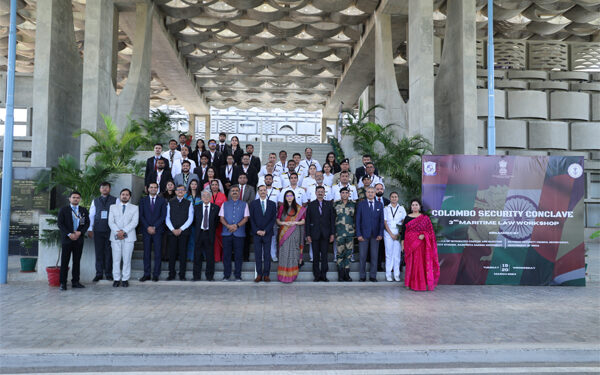- 3rd edition of the Maritime Law Workshop: Vice Admiral G Ashok Kumar, National Maritime Security Coordinator (NMSC) eloquently articulates the mounting pressure to address the evolving non-traditional threats to maritime security, particularly in the Indian Ocean region
- Sushil Goswami, University Dean & Director SICMSS emphasizes the integral role of the School of Integrated Coastal and Maritime Security Studies (SICMSS) in contributing meaningfully in the domain of coastal and maritime security
- Prof (Dr) Bimal N Patel, Vice Chancellor, RRU highlights the importance of the International Law Commission and its continuous work on the sea level rise, piracy and armed robbery at sea
NE EDUCATION BUREAU
GANDHINAGAR, MARCH 21
Chief of the Naval Staff (CNS) Admiral R Hari Kumar called for continued regional cooperation and coordinated efforts to overcome maritime security challenges through the platform of Rashtriya Raksha University.

The third edition of the Colombo Security Conclave Maritime Law Workshop was held from 19th to 20th March 2024 at the School of Integrated Coastal and Maritime Security Studies, Rashtriya Raksha University. Participants included legal experts from maritime security and maritime law enforcement agencies of CSC nations along with the armed services personnel from the Indian Navy, the Indian Coast Guard, the Border Security Force, the Central Industrial Security Force and the National Academy of Coastal Policing.
Participants discussed legal regimes concerning Maritime Domain Awareness; legal means to counter maritime grey zone activities; applicability of cyber and information security laws in the maritime domain to counter emerging threats and shared best practices from a legal perspective towards mitigating the various challenges pertaining to maritime security.
Sushil Goswami, University Dean & Director SICMSS delivered a welcome address, expressing his pleasure in hosting the 3rd edition of the Maritime Law Workshop. He emphasized the integral role of the School of Integrated Coastal and Maritime Security Studies (SICMSS) in contributing meaningfully in the domain of coastal and maritime security. The conclave is tailored to foster engagements and knowledge-sharing among member and observer states regarding maritime law and order matters in the Indian Ocean Region (IOR), with a focus on areas such as maritime law awareness, maritime zone activities, and cyber and information security.
Vice Admiral G Ashok Kumar, National Maritime Security Coordinator (NMSC) eloquently articulated the mounting pressure to address the evolving non-traditional threats to maritime security, particularly in the Indian Ocean region. He underscored the criticality of maritime security to national prosperity, highlighting that over 80% of global trade relies on maritime routes. He further emphasized the imperative for comprehensive maritime law enforcement, and a need for awareness and collaboration among nations to address identified gaps effectively. He lauded the initiatives of the Vice Chancellor, Rashtriya Raksha University for organizing this conclave. Also, the operationalization of the Information Fusion Centre for the Indian Ocean Region (IFC-IOR) by the Indian Navy, which facilitates efficient collation and distribution of maritime domain awareness (MDA).
Moreover, he underscored the importance of aligning domestic laws with international regulations to effectively combat maritime crimes, such as piracy and drug trafficking. Lastly, he stressed upon the transnational nature of maritime threats and advocated for a multinational approach, exemplified by collaborative efforts between the Indian Navy and Coast Guard with Colombo Security Conclave (CSC) countries.
Prof (Dr) Bimal N Patel, Vice Chancellor, RRU highlighted the major achievements of the School of Integrated Coastal and Maritime Security Studies in the domain of coastal and maritime security law and governance. Furthermore, he provided detailed data analysis on the various incidents arising from non-traditional threats, joint maritime exercises, engagements and operations undertaken by the Indian Navy, Indian Coast Guard along with the friendly states of the Colombo Security Conclave ensuring and promoting stability and security in the Indian Ocean Region (IOR). Through the platform of the Colombo Security Conclave, Professor highlighted the importance of the International Law Commission and its continuous work on the sea level rise, piracy and armed robbery at sea. He invited all of the members present to be a part of it, presenting their best practices and strengthening the voice of the global south.
Admiral R. Hari Kumar, Chief of the Naval Staff (CNS) acknowledged India’s long standing maritime heritage and its vision for an open and inclusive Indo-Pacific region. CNS underscored the importance of the seas as a catalyst for growth, prosperity, and cultural exchange referring to Prime Minister Modi’s vision for a rule-based order. He highlighted the importance of cooperative mechanisms and multilateral forums, such as the Colombo Security Conclave, in addressing maritime security challenges collectively. He applauded initiatives like the Maritime Law Workshop for fostering collaboration and interoperability among maritime law enforcement agencies.
Through the forum he called for continued regional cooperation and coordinated efforts to overcome maritime security challenges. He expressed confidence that the workshop would yield valuable insights and contribute to enhancing maritime security across the Indian Ocean region.
Manish Kumar Singh expressed gratitude to the National Maritime Security Coordinator, to the Chief of the Naval Staff for their visionary words recognizing the significant role played by the nation's maritime forces and leadership in promoting safety and security in the Indian Ocean region. He further expressed his sincere gratitude to all the CSC nations and the Indian armed services personnel for their active participation during the conclave through Rashtriya Raksha University.












